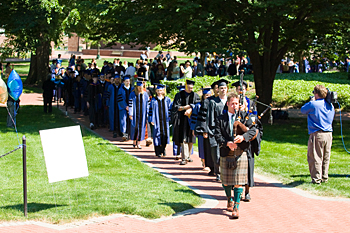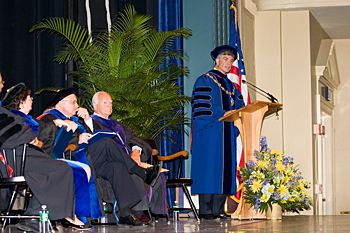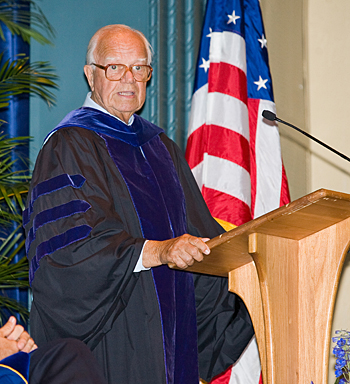The event began with a bagpipe-accompanied procession of the candidates and their advisers in full academic regalia across The Green from Memorial Hall. UD President Patrick Harker, the deans of the colleges and University officials led the procession into Mitchell Hall, where the candidates filled the first four rows of the auditorium as officials took the stage.
Carolyn A. Thoroughgood, vice provost for research and graduate studies at UD, welcomed all present and, after congratulating the candidates, spoke of the University's growing prominence as a research and graduate institution.
“The University is more of a graduate institution today than it ever has been before,” Thoroughgood said. “It offers doctoral degrees in 43 fields and master's degrees in 110 fields.”
Thoroughgood addressed what she called “the lonely nature of research” and praised candidates' perseverance before turning the podium over to Harker, adding as she closed her remarks that “at the heart of all graduation lies the pursuit of knowledge.”
Harker congratulated the candidates, their advisers and supportive family members and friends on their achievements and introduced guest convocation speaker E. Wayne Craven, H.F. du Pont Professor Emeritus of Art History at UD. Craven was a recipient of an honorary Doctor of Humane Letters degree at Commencement on May 31.
“It is a pleasure to join you this afternoon for what is a very important day in your lives, and also a very important day in the life of this University,” Harker told the candidates. “Your accomplishment, which was achieved through hard work, innovation and collaboration, reflects well on your character. You have met difficult challenges along the way, and you have overcome them.”
Harker noted the candidates' hard work and intellectual curiosity and emphasized the role that the University and its dedicated faculty played in shaping their academic success. “By your success, you honor not only yourself,” he said, “but also the entire University of Delaware community.”
He cited the University's high research activity rating by the Carnegie Foundation for the Advancement of Teaching, a designation reserved for fewer than 3 percent of the more than 4,300 degree-granting institutions in the United States, and said that with academic achievement comes a personal responsibility to improve society.“I encourage you to always remember the moment of discovery, to keep pushing the envelope, always questioning, testing, demanding,” Harker said, “and I'd also like to encourage you to do one more thing: Pass your joy of knowledge along to others.”
Craven began his address by sharing memories of his own doctoral degree conferral. He touched on both the joys and challenges of entering the workforce with a high level of education, drive and intellectual curiosity, and spoke of the double-edged nature of competition.
“Those of you who are about to receive your doctoral degree now stand at the gate of the great unknown,” Craven said. “Don't be afraid of that. You've worked hard, you've been highly trained and now the world is yours.
“If I could give you the biggest piece of advice,” he continued, “it would be not to fear competition, but to make it work for you.”
Using the analogy of tennis, Craven advised the doctoral candidates that their “game would never really improve unless [they were] challenged and play[ed] against the best.”
“Wherever you go now, seek out the best and make it work for you,” Craven said, “and if you go into academe, weave yourself into that community, because in the end you'll serve your own cause as well as the University's.”
After Craven's address, Mary Martin, assistant provost for graduate studies at UD, introduced the four dissertation awards and the two outstanding doctoral graduate student advising and mentoring awards.
The four student dissertation awards were bestowed on Maitreya Natu, who won the Allan P. Colburn Prize in Engineering and Mathematical Sciences; Margaret Elizabeth Leigey, who won the George Herbert Ryden Prize in Social Sciences; Sandra Cheng, who won the Wilbur Owen Sypherd Prize in Humanities; and Anne Marie Shough, who won the Theodore Wolf Prize in Physical and Life Sciences.
Two UD professors, Suresh G. Advani, George W. Laird Professor of Mechanical Engineering, and Charles G. Riordan, professor of chemistry and biochemistry, were honored with Outstanding Doctoral Graduate Student Advising and Mentoring awards.Martin asked all doctoral candidates and their advisers to stand, in order to show their honorary regalia, and gave a brief history of the significance of the hood before presiding over the hooding ceremony with Provost Dan Rich. During the ceremony, the candidates crossed the stage with their advisers, were hooded by their college deans and received their diplomas from Harker and Thoroughgood.
“The most colorful and significant garment of the outfit is the hood, which is 4 feet long, has panels on either side and is worn with the lining, which signifies the discipline, exposed,” Martin said.
Rich, who flanked Martin on the stage, congratulated the doctoral candidates and noted that their degrees would not be official until after UD's 159th Commencement, held May 31.
The ceremony concluded with the singing of the University's Alma Mater by Tyler Tejada, a UD senior from Middletown, Del., majoring in music. The hooded graduates, led by Harker, college deans and other University dignitaries, then adjourned to an outdoor reception.
Article by Becca Hutchinson
Photos by Kevin Quinlan, AS '05





